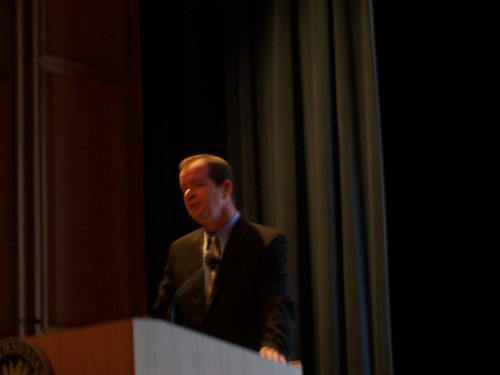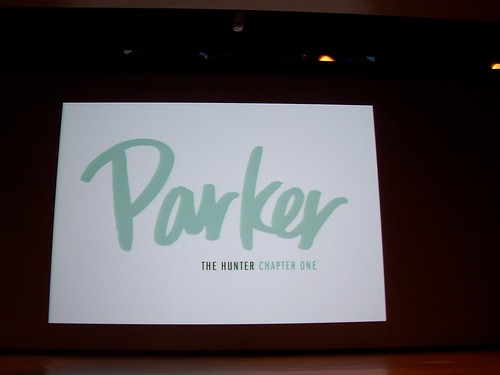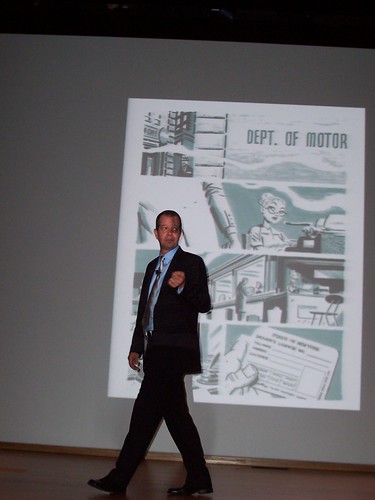by Mike Rhode
Darwyn Cooke has been one of my favorite comic book artists for about a decade and a half. He passed away over the weekend.
Darwyn Cooke has been one of my favorite comic book artists for about a decade and a half. He passed away over the weekend.
I had forgotten that I had written about a talk he gave at the Smithsonian American Art Museum. It doesn't seem to be online at their site anymore, so I'll reproduce it here. Also, you can hear my recording of the talk here, newly online since sadly we won't be able to hear any new thoughts from him.
(I didn't write that lede by the way)
by Mike Rhode Washington City Paper blog Feb. 3, 2010
Sure, the crowd was thin due to the snow. But the air was thick with nuggets: Darwyn Cooke spoke for almost two hours to a rapt crowd of about 40 people at the Smithsonian's American Art Museum Saturday, concentrating on his recent adaptation of Richard Stark's novel Parker: The Hunter and offering a glimpse into the mind of a successful, critically adored cartoonist. Just don't, he said, call him a creator. Cooke would rather be known, simply, as someone who entertains, and that's exactly what he did at Saturday's event. Read some of his more memorable quotes:
"I was pretty sure the Smithsonian called the wrong number when they approached me about this program, but I jumped at the chance to come down to talk about Don Westlake [aka Richard Stark] and Parker—two of my favorite subjects."
"The [Parker] books are very lean and brutal and I think that's part of what I loved about them…."
"I have to plan everything. I have to write biographies of all my characters, I have to research every scene and situation, and then I have to outline it in great detail in order for me to feel secure enough to go ahead with the work…" in contrast to Westlake's lack of plotting, backstory or details about Parker's life.
"The Hunter was written in 1962, which was actually the year I was born, which I thought was kind of neat."
"When I was a kid, I used to love series novels, like The Executioner, and all these sort of terrible B-movie type paperbacks…. but as I got older I realized that the quality of the writing in them was terrible and I moved on to more literate fare."
"[Westlake] was able to keep [Parker] completely reprehensible, and yet completely magnetic. He's certainly not a person you'd want to have to deal with in your life, but he's a very interesting, very magnetic type of character."
"Parker as a character represents something that we've seen evaporate from the American landscape over the last century and it's probably the last period of time when a character like this could have existed—that's basically a free-market anarchist. A man who makes his own rules, lives by his own rules, his own judgments and society still has room for him to operate within."
"The only thing I can compare [the plot] to is, you know when you get a phone bill for $500 for one month, and it's a mistake and you phone the phone company to get it straightened out? That's what he goes through. That's what this book is—it's a man who got screwed and is trying to communicate through a large faceless corporation that he's been screwed and he's owed something and the frustration that comes out of that. When you consider the time that the book was written, I think it's a very sly sort of indictment of the world we were all looking into."
"What can I do to reach outside the comic book audience… How can I get outside this [direct] market? How can I reach other readers with my work? The only real viable option at the time was the idea of original graphic novels. I very quickly set my sights there. … It's still a very risky creative venture. To put out an original graphic novel and hope it finds an audience is a very risky venture. We've seen some incredible books in the last few years, whether it's Persepolis, or Asterios Polyp or Diary of Wimpy Kid or American Born Chinese. These are all graphic novels that have nothing to do with superheroes…but they all have audiences that responded to the stories within the books. That really gave me the juice and the excitement to move forward…"
"DC had contacted me about doing Will Eisner's The Spirit. As much I was ready to move on, they found the one project that would keep me there. I hope this doesn't sound the wrong way, but half the reason I wanted to do this project was to make sure it didn't get screwed up by somebody else. It was purely a defensive position I was taking around the character… That was a hard year trying to live up to Will's work and deal with that character and everything it meant, so I was really thrilled when it was over…"
"At the time I started to correspond with Westlake, he was 72 years old, but his enthusiasm for this was unbelievable…"
"As for as he was concerned, if I screwed up [the adaptation], it didn't matter. Because the book's still there."
On having difficulties with character design and not receiving guidance from Westlake: "Finally I forced him into laying it out. '[Parker] is Jack Palance. It's Jack Palance from a movie called Panic in the Streets. That's what I saw in my head when I wrote it.' So from that point on I was able to fashion a character and an approach that Donald was really thrilled by."
Cooke planned on submitting the book to Westlake for Christmas, but Westlake went on vacation and died before Cooke sent it to him. "He never got to see any of it and it took about six weeks to get back to work. It really stopped me in my tracks and I realized that I'd been doing it for an audience of one person and that audience was gone. I didn't even know why I was doing the book for a little while after that."
At this point, Cooke read from the actual novel while showing the first chapter of his adaption on the screen.
"Those of you familiar with my earlier work should know I'm pretty plugged into the 'heroic ideal' and I love the notion of optimism and hope and I'd like to think that most of my work carries those messages right up front and this was a case I had to put all my instincts aside and sort of go more with Donald's."
"Nothing was better back then [in 1962] except the way things looked…"
"Anything I could do visually to immerse us in—to make us feel that we were back in that time period—was gonna help people get into the book. Everything in here was done with the tools available in 1962. There's no computer lettering, there's no digital tinting. It's drawn on the art board, the black ink is laid down, the lettering is laid down, and then I take a blue watercolor and lay it right onto the board. Nobody does this anymore…I even had the printers lay a pale yellow ink on top of every page before the artwork went down so that the book even had the appearance of being yellowed with age…"
"I'm hard at work on the second book now, about halfway through. It's called The Outfit and that's going to be out in October…I'm doing four [adaptations]."
"I've never been comfortable with the terms 'artist' or 'creator.' I think they're bullshit terms that are thrown around to make the guys who do the work feel better about themselves. For example, Jack Kirby was a creator. Jack Kirby created entire universes. Ethan Van Sciver pencils a comic book—there's a big difference there. I've always been very uncomfortable when people referred to me as a creator…I've always preferred entertainer, or storyteller. Those I'm much prouder of, or more comfortable with those designations. I'm not that deep. I'm just not."
"I love stories about people who've found ways to live without having to suck up to The Man."
"Heroes aren't heroes anymore; they're just people with power. And I think that it's a shame."




